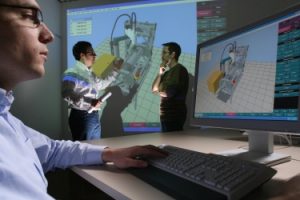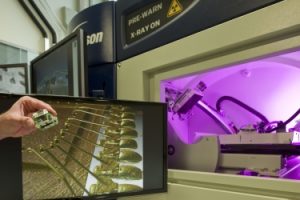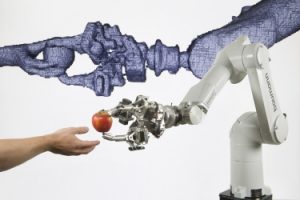Background of the research:
A radome serves as a protective housing for a radar sensor, safeguarding it from external influences such as rain, snow, and hail to ensure optimal sensing operation while driving. In extremely cold weather conditions, heating structure is typically implemented to de-ice or remove snow from the radome surface. Unlike conventional manufacturing methods for heating structures, such as embedded heating wires or coatings, FAPS is extensively researching the application of digital printing technology for the fabrication of such heating structure. The potential advantages of fast and flexible design customization, as well as 3D functionalization offered by digital printing technology represent an important differential advantage for OEMs.
One of the important aspects in the manufacturing process is the encapsulation of the heating structure, which is crucial to ensure the required lifetime of the prototype. Appropriate encapsulation methods are needed not only to protect the printed heating structure but also to ensure interference-free radar signal transmission. In the course of the thesis, possible suitable encapsulation methods will be investigated and encapsulated prototype will be evaluated for its durability and reliablity.
Possible work packages:
- Literature review and familiarization with the topic of encapsulation methods for heating structures
- Conducting printing experiments to fabricate heating structures on radomes
- Investigation of encapsulation methods
- Performing durability tests such as humidity test and thermal shock test.
- Analysis of the heating behavior before and after durability tests, considering the homogeneity of heating, achievable temperature, and the occurrence of hotspots.
- Documentation of the work
Prerequisites:
- Thorough, structured, and independent working style
- High self-motivation and affinity for experimental work
(digital printing, e.g., Piezo-Jet printing) - Effective communication skills
- Good proficiency in German or English
- Further information available upon request; workload can be adjusted based on the project’s requirements
- Lack of prior knowledge can be addressed with on-the-job training
Begin:
Immediately
For application, kindly send your resúme and transcript to koksiong.siah@faps.fau.de
Categories:
Research Sector:
Electronics ProductionType of thesis:
Bachelor Thesis, Master Thesis, Project ThesisContact:
Kok Siong Siah, M. Sc.
Lehrstuhl für Fertigungsautomatisierung und Produktionssystematik (FAPS)
Elektronikproduktion
- Phone number: +49911530299091
- Email: koksiong.siah@faps.fau.de







![[BA / PA / MA]: Feasibility and reliability study on encapsulation methods for printed heating structure in an automobile radar system](/wp-content/uploads/sites/3/2024/01/Machbarkeitsstudie-und-Zuverlassigkeitsuntersuchung-der-Verkapselungsmethode-266x200.png)